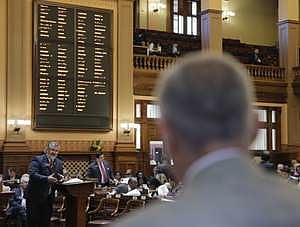Georgia legislature overwhelmingly rejects river easements for Spectra’s Sabal “Sinkhole” Trail Pipeline
By: John S. Quarterman

John S. Quarterman is President of WWALS Watershed Coalition, Inc., the Waterkeeper® Affiliate for the Withlacoochee, Alapaha, and Upper Suwannee River watersheds.
On March 22, 2016, Georgia State representatives voted to defeat SR954, which would have granted easements to construct the Sabal Trail Pipeline under rivers and near springs.
Georgia Sierra Club’s Colleen Kiernan summed up what happened that day to the river-drilling easements for Spectra Energy’s proposed Sabal Trail Pipeline this way:
“Y’all! We don’t win votes on the House floor every day, and the [failed]effort to keep the state easements for the Sabal Trail Pipeline was truly a joy to watch. R’s, D’s, lawyers, community folk, everyone pitched in and it “went down in flames” 34-128 — AJC [Atlanta Journal Constitution] reporter’s words, not mine! Congrats to all the Georgia Water Coalition…. “
Yes, that’s the same Spectra of the Algonquin Incremental Market (AIM) Project, PennEast, Atlantic Bridge, South Texas Expansion, the West Coast Pipeline in British Columbia, and far too many other unnecessary pipeline invasions throughout North America. Veteran Sierra Club lobbyist Neill Herring was even pithier:
“It’s the most votes I’ve ever gotten on anything.”
Georgia Water Coalition organized actions with its partners and others, including Flint Riverkeeper, Chattahoochee Riverkeeper, Waterkeeper Affiliate WWALS Watershed Coalition, Sierra Club, Greenlaw of Atlanta, Georgia River Network, SpectraBusters and many others. By speaking on the statehouse floor in Atlanta, calling and emailing legislators, writing letters to the editor, and posting to social media, the coalition was able to secure this important victory.
Georgia Water Coalition listed Sabal Trail in its Dirty Dozen 2015, for the second year running, writing:
Southwest Georgia residents are fighting an invader—a 3-foot wide, 500-mile-long monster of a natural gas pipeline that would ultimately stretch from Alabama to Central Florida. Its owners have called it the Sabal Trail Pipeline, put opponents have dubbed it the “Sinkhole Trail Pipeline” because of its dangerous path through southwest Georgia where sinkholes are common and could result in catastrophic gas leaks. While Florida Power & Light and its customers get the natural gas, Georgians would only have their property taken and be left living with the constant threat of pipeline leaks that could contaminate drinking water or result in life-threatening explosions. If approved by federal authorities and Georgia environmental regulators, pipeline companies would be granted the right to take private property by eminent domain.
On the last day of the Georgia legislative session, March 24th, Flint Riverkeeper Gordon Rogers concluded: “It is finished. The revised version of the bill, which contains nothing for Sabal Trail, is on the Governor’s desk now. Because the governor cannot veto what he doesn’t get, Sabal Trail’s Georgia river easements are dead!”
But the fight isn’t over. Sabal Trail is already suing landowners in Florida, Georgia, and Alabama for federal eminent domain, after the Federal Energy Regulatory Commission (FERC) issued Sabal Trail a Certificate of Convenience and Necessity in February. The U.S. Army Corps of Engineers hasn’t issued a permit yet.
There are six Sabal Trail rehearing requests before FERC, including one from each pipeline company, Sabal Trail and Williams Transco. Just a few weeks ago, for the first time ever, FERC denied another pipeline permit; perhaps they may have second thoughts?
The opposition to Sabal Trail and its ugly stepsisters is rapidly increasing. Opposition against two additional natural-gas pipelines in Florida, already-approved liquid natural gas (LNG) export operations, and an already-approved scheme by Florida East Coast Railway to ship LNG up and down Florida is growing. Hamilton County, Florida, just asked the Army Corps to do its own report on the springs and sinkholes Sabal Trail neglected to tell FERC about.
The Georgia legislature approved an 18-month moratorium on petroleum-products pipelines, and on March 30th, Kinder Morgan, suspended work on its Palmetto Project; both of these successes owe a lot to Push Back the Pipeline, a coalition including Savannah Riverkeeper, Ogeechee Riverkeeper, Altamaha Riverkeeper, Satilla Riverkeeper, and St Johns Riverkeeper.
Thanks to coordinated grassroots efforts, the people of Georgia won two times in one week. We invite everyone to help us stop Sabal Trail for good; head to http://www.wwals.net/issues/stt/ to learn more.